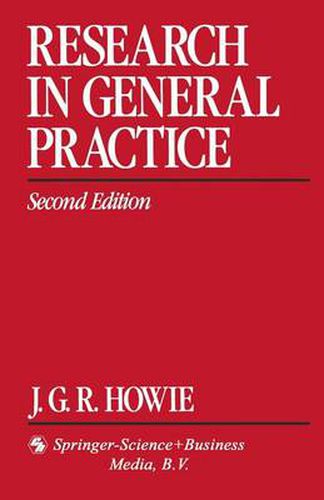Readings Newsletter
Become a Readings Member to make your shopping experience even easier.
Sign in or sign up for free!
You’re not far away from qualifying for FREE standard shipping within Australia
You’ve qualified for FREE standard shipping within Australia
The cart is loading…






This title is printed to order. This book may have been self-published. If so, we cannot guarantee the quality of the content. In the main most books will have gone through the editing process however some may not. We therefore suggest that you be aware of this before ordering this book. If in doubt check either the author or publisher’s details as we are unable to accept any returns unless they are faulty. Please contact us if you have any questions.
One of the paradoxes of general practice is that we emphasize on the one hand how important it is that the general practitioner learns to tolerate uncertainty, and then regret on the other hand that so few general practitioners research the uncertainties they find in their every day work. In the first chapter of my first edition of this book I suggested that general practitioners were missing opportunities to take part in a fascinating and rewarding professional activity because of an unnecessary fear of the unknown, and tried to encourage more to try research for themselves. There has been an impressive increase in what has been asked about, researched and written about in the last decade and this second edition tries to bring up to date the advice I think may help others to become involved in research for themselves. The basic principles of good research are of course timeless and apply to enquiry in any discipline. However, detail changes; there are new aids to reviewing literature, the increased emphasis in social science research has been matched by a range of new methods of collecting information, computers have revolutionized how data is handled and statistics is an ever-developing science in its own right. The chapters in this book which describe what can be referred to as the technology of the research process have been revised to reflect the impact of these recent developments rather than re-written.
$9.00 standard shipping within Australia
FREE standard shipping within Australia for orders over $100.00
Express & International shipping calculated at checkout
This title is printed to order. This book may have been self-published. If so, we cannot guarantee the quality of the content. In the main most books will have gone through the editing process however some may not. We therefore suggest that you be aware of this before ordering this book. If in doubt check either the author or publisher’s details as we are unable to accept any returns unless they are faulty. Please contact us if you have any questions.
One of the paradoxes of general practice is that we emphasize on the one hand how important it is that the general practitioner learns to tolerate uncertainty, and then regret on the other hand that so few general practitioners research the uncertainties they find in their every day work. In the first chapter of my first edition of this book I suggested that general practitioners were missing opportunities to take part in a fascinating and rewarding professional activity because of an unnecessary fear of the unknown, and tried to encourage more to try research for themselves. There has been an impressive increase in what has been asked about, researched and written about in the last decade and this second edition tries to bring up to date the advice I think may help others to become involved in research for themselves. The basic principles of good research are of course timeless and apply to enquiry in any discipline. However, detail changes; there are new aids to reviewing literature, the increased emphasis in social science research has been matched by a range of new methods of collecting information, computers have revolutionized how data is handled and statistics is an ever-developing science in its own right. The chapters in this book which describe what can be referred to as the technology of the research process have been revised to reflect the impact of these recent developments rather than re-written.